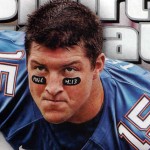Every week in The Kiddy Pool, Erin Newcomb confronts one of many issues that parents must deal with related to popular culture.
As I watched the parade of nations on Friday evening, I noticed how many athletes there were. Athletes who will not advance to the finals of their events. Athletes with no real chance of medaling. Athletes who are, in some cases, the only representative of their country, or who keep company with only a handful of compatriots. The Olympic motto of “stronger, higher, faster” applies to all of the athletes competing in London, and yet most of them will remain anonymous, happy just to be part of the festivities.
But simply making it to the party was not on the agenda for American female gymnast Jordyn Wieber. The reigning world champion failed to advance in the individual all-around championship after being bested by teammates Aly Raisman and Gabby Douglas. The rules only allow two competitors from each nation to qualify for the finals, and most folks, including a weeping Wieber, thought she would be in contention for the all-around gold. Now, at age 17, that hope has shattered; Wieber can focus on the team competition, but she must know, given the grueling nature of a sport that particularly favors youth, that she is unlikely to get another chance in 2016. This is it — the culmination of years of work and hope and sacrifice.
The broadcast images of a distraught, tearful Wieber stand in stark contrast to a series of ads run by P&G. One features a gymnast, a little girl, frowsy-headed and utterly adorable, being awakened for early-morning practices by her mother. The ad follows the child through her training, up to qualifying for the Olympics, with her mother in the background serving as laundress, chef, chauffeur, and cheerleader. When the girl qualifies, she rushes to her mother and hugs her, making (the ad suggests) all those sacrifices worthwhile. At the end of the ad, the text reads “The hardest job in the world is also the best job. P&G, proud sponsor of moms.”
http://www.youtube.com/watch?v=NScs_qX2Okk&w=600
Never mind the irony of “sponsoring” the moms who actually purchase the products that support P&G. There’s so much missing from this ad, like the rest of the family, who probably also made tremendous sacrifices to support one member’s Olympic hopes. Then there is the sacrifice of normality for children whose only way of life is filled with gymnasiums and practices and competitions; how much choice can they make if they know nothing else? Missing too are all the children who didn’t qualify, but who made (along with their families, and in some cases, entire communities) just as many sacrifices.
I wonder what those families would say about the cost of raising an Olympian, or an almost-but-not-quite-Olympian. I love Olympic season and I love competitive athletics; I run, and I hope that both of my daughters someday find a sport they love as much, where they can develop the discipline and endurance and friendships (some of the greatest of my life, including my husband) that I have found through athletics. But on some level, I think what really bothers me about the P&G commercial is where it ends, with a child whose life peaks at the Olympics. So many of these athletes, especially in women’s gymnastics, are really still children. I know firsthand that athletics can be a lifelong gift, but I have never sacrificed my family or devoted my life to my sport. I’ve simply never been good enough to warrant that, which means that I see myself and my life as shaped by — but not defined by — sport.
Most of the athletes competing in the Olympic games will come home to families and work and fade out of the spotlight that this season brings. Some, like Wieber, may wrestle with the disappointing conclusion to their hopes and dreams. I hope that all of them can find meaning in the sacrifices they’ve made and recognize that, despite what the P&G ad implies, there is life beyond the Olympics. After all, Wieber is really only a girl. She too is shaped by her sport, but we are all defined not by what we do or who we are (Olympian or not), but by Whose we are. There is a greater, transcendent sacrifice that can soothe even heartbroken children (and their families). But I guess that’s easy for me to say, because I’m not raising any Olympians.















